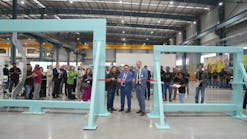New Advanced-Technology Diesel Engines Playing Greater Role in General, Business Aviation Ground Service Equipment and Fixed Base Operations
Alongside increasing demand for business and general aviation services, investments are also growing in new ground service equipment being introduced by fixed base operators (FBOs) to service and maintain the nation’s growing aircraft fleet. This means the newest generation of advanced-technology diesel engines are present in growing in numbers on airport tarmacs across the nation.
At every airport in the U.S., FBOs use fueling trucks, tug and tow tractors, and other service vehicles to provide essential fueling and aircraft marshaling and maintenance services for general and business aviation aircraft. Many of these vehicles are powered by diesel engines, relying on the power, performance, reliability, durability and economical operation offered by diesel technologies. Many of these ground service units have been in continuous use for decades, due to their relatively low miles and limited operational area, the airfield and surrounding ramp operations.
These vehicles and equipment offer performance optimized to reduce emissions and improve air quality for ground service operators and other airport personnel. Beginning in 2011, all new commercial on-road vehicles and subsequently in 2014 almost all new offroad engines and equipment – including ground service vehicles and marshalling equipment – utilize new diesel emissions control systems. This technology, known as selective catalytic reduction systems (SCR), enables the vehicle or equipment to achieve near-zero emissions performance and meet emissions requirements established by the U.S. Environmental Protection Agency. These active emissions control systems require the periodic replenishment with Diesel Exhaust Fluid (DEF), a form of aqueous urea. Replacement of DEF is done based on the vehicle hours used or miles driven.
DEF is widely available across the United States in a variety of packaging and dispensing options including gallon jugs and boxes at common retail outlets, service stations and automotive supply stores, as well as in drums and other portable containers as well as above ground storage and dispensing units for fleet services.
Training, Education, Labeling Best-Practices to Ensure Proper Use of DEF
As the latest diesel-powered vehicles and ground service equipment enter the fleet, it is an appropriate time to review basic education and training for ground-service equipment operators, particularly those that fuel aircraft and vehicles, on how to properly use, handle and store DEF.
Several isolated incidents have been reported involving the accidental mixing of DEF and other aviation fluids. DEF can be mistaken for other clear, colorless liquids, such as fuel system icing inhibitors (FSII). Both products can be purchased in bulk and transferred to smaller containers for ease of use. Both are usually stored in milky white containers. Also, airport refueling trucks are serviced with both products.
To ensure against the accidental introduction of DEF into any aircraft fuel, we recommend that FBO’s follow the NTSB safety bulletin, and work with diesel engine and equipment dealers and their fuel suppliers to understand the proper use and storage of DEF. FBOs should also institute ongoing training, labeling and storage practices to help ensure aviation safety. The work done by the Aircraft Diesel Exhaust Fluid Working Group and their report in June has contributed a substantial understanding to the issue, and offers strong short- and long-term recommendations.
Since its first introduction into the U.S. vehicle fleet in 2010, DEF producers, distributors and dealers have worked together to develop and implement quality programs, including effective storage and dispensing practices, at thousands of locations across the country. In 2018, about 800 million gallons of DEF were produced, according to industry sources.
SCR systems utilizing diesel exhaust fluid were successfully introduced nearly nine years ago into the U.S. on-highway vehicle fleet, and have enabled the newest generation of diesel engines and equipment to achieve remarkable reductions in exhaust emissions, while also scoring gains in fuel efficiency. Airport operations will benefit from dramatically lower emissions from the ground service fleet when putting new diesel technology into service.




